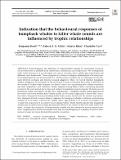Indication that the behavioural responses of humpback whales to killer whale sounds are influenced by trophic relationships
Abstract
Eavesdropping, the detection of communication signals by unintended receivers, can be beneficial in predator-prey interactions, competition, and cooperation. The cosmopolitan killer whale Orcinus orca has diverged into several ecotypes which exhibit specialised diets and different vocal behaviours. These ecotypes have diverse ecological relationships with other marine mammal species, and sound could be a reliable sensory modality for eavesdroppers to discriminate between ecotypes and thereby respond adaptively. Here, we tested whether humpback whales Megaptera novaeangliae in the Northeast Atlantic responded differently to playback of the sounds of 2 killer whale ecotypes, Northeast Atlantic herring-feeding killer whales representing food competitors and Northeast Pacific mammal-eating killer whales simulating potential predators. We used animal-borne tags and surface visual observations to monitor the behaviour of humpback whales throughout the playback experiments. Humpback whales clearly approached the source of herring-feeding killer whale sounds (5 of 6 cases), suggesting a ‘dinner-bell’ attraction effect. Responses to mammal-eating killer whale sounds varied with the context of presentation: playback elicited strong avoidance responses by humpback whales in offshore waters during summer (7 of 8 cases), whereas the whales either approached (2 of 4 cases) or avoided (2 of 4 cases) the sound source in inshore waters during winter. These results indicate that humpback whales may be able to functionally discriminate between the sounds of different killer whale ecotypes. Acoustic discrimination of heterospecific sounds may be widespread among marine mammals, suggesting that marine mammals could rely on eavesdropping as a primary source of information to make decisions during heterospecific encounters.
Citation
Benti , B , Miller , P J O , Biuw , M & Curé , C 2021 , ' Indication that the behavioural responses of humpback whales to killer whale sounds are influenced by trophic relationships ' , Marine Ecology Progress Series , vol. 660 , pp. 217-232 . https://doi.org/10.3354/meps13592
Publication
Marine Ecology Progress Series
Status
Peer reviewed
ISSN
0171-8630Type
Journal article
Description
Funding: This research has been part of the 3S (Sea mammals, Sonar, Safety) project funded by the US Office of Naval Research, the Royal Norwegian Navy, the Norwegian Ministry of Defence, the Defence Research and Development Department of the Netherlands Ministry of Defence, and the French Ministry of Defence (DGA).Collections
Items in the St Andrews Research Repository are protected by copyright, with all rights reserved, unless otherwise indicated.

